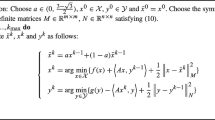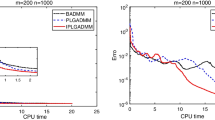Abstract
In order to solve large sparse linear complementarity problems on parallel multiprocessor systems, we construct modulus-based synchronous two-stage multisplitting iteration methods based on two-stage multisplittings of the system matrices. These iteration methods include the multisplitting relaxation methods such as Jacobi, Gauss–Seidel, SOR and AOR of the modulus type as special cases. We establish the convergence theory of these modulus-based synchronous two-stage multisplitting iteration methods and their relaxed variants when the system matrix is an H + -matrix. Numerical results show that in terms of computing time the modulus-based synchronous two-stage multisplitting relaxation methods are more efficient than the modulus-based synchronous multisplitting relaxation methods in actual implementations.
Similar content being viewed by others
References
Bai, Z.-Z.: On the convergence of the multisplitting methods for the linear complementarity problem. SIAM J. Matrix Anal. Appl. 21, 67–78 (1999)
Bai, Z.-Z.: Modulus-based matrix splitting iteration methods for linear complementarity problems. Numer. Linear Algebra Appl. 17, 917–933 (2010)
Bai, Z.-Z., Evans, D.J.: Matrix multisplitting relaxation methods for linear complementarity problems. Int. J. Comput. Math. 63, 309–326 (1997)
Bai, Z.-Z., Evans, D.J.: Matrix multisplitting methods with applications to linear complementarity problems: parallel synchronous and chaotic methods. Réseaux et Systèmes Répartis: Calculateurs Parallelès 13, 125–154 (2001)
Bai, Z.-Z., Evans, D.J.: Matrix multisplitting methods with applications to linear complementarity problems: parallel asynchronous methods. Int. J. Comput. Math. 79, 205–232 (2002)
Bai, Z.-Z., Sun, J.-C., Wang, D.-R.: A unified framework for the construction of various matrix multisplitting iterative methods for large sparse system of linear equations. Comput. Math. Appl. 32, 51–76 (1996)
Bai, Z.-Z., Zhang, L.-L.: Modulus-based synchronous multisplitting iteration methods for linear complementarity problems. Numer. Linear Algebra Appl. (2012). doi:10.1002/nla.1835
Berman, A., Plemmons, R.J.: Nonnegative Matrices in the Mathematical Sciences. Academic Press, New York (1979)
Cottle, R.W., Pang, J.-S., Stone, R.E.: The Linear Complementarity Problem. Academic Press, San Diego (1992)
Cvetković, Lj.: Some convergence conditions for a class of parallel decomposition-type linear relaxation methods. Appl. Numer. Math. 41, 81–87 (2002)
Cvetković, Lj., Kostić, V.: New subclasses of block H-matrices with applications to parallel decomposition-type relaxation methods. Numer. Algorithms 42, 325–334 (2006)
Cvetković, Lj. , Peña, J.M.: Minimal sets alternative to minimal Geršgorin sets. Appl. Numer. Math. 60, 442–451 (2010)
Dong, J.-L., Jiang, M.-Q.: A modified modulus method for symmetric positive-definite linear complementarity problems. Numer. Linear Algebra Appl. 16, 129–143 (2009)
Frommer, A., Mayer, G.: Convergence of relaxed parallel multisplitting methods. Linear Algebra Appl. 119, 141–152 (1989)
Frommer, A., Szyld, D.B.: H-splittings and two-stage iterative methods. Numer. Math. 63, 345–356 (1992)
Hadjidimos, A., Tzoumas, M.: The principle of extrapolation and the Cayley transform. Linear Algebra Appl. 429, 2465–2480 (2008)
Hadjidimos, A., Tzoumas, M.: Nonstationary extrapolated modulus algorithms for the solution of the linear complementarity problem. Linear Algebra Appl. 431, 197–210 (2009)
Leenaerts, D.M.W., van Bokhoven, W.M.G.: Piecewise Linear Modeling and Analysis. Kluwer Academic, Dordrecht (1998)
Murty, K.G.: Linear Complementarity, Linear and Nonlinear Programming. Heldermann, Berlin (1988)
O’Leary, D.P., White, R.E.: Multi-splittings of matrices and parallel solution of linear systems. SIAM J. Algebraic Discrete Methods 6, 630–640 (1985)
Szyld, D.B., Jones, M.T.: Two-stage and multisplitting methods for the parallel solution of linear systems. SIAM J. Matrix Anal. Appl. 13, 671–679 (1992)
Varga, R.S.: Matrix Iterative Analysis. Springer, Berlin (2000)
Author information
Authors and Affiliations
Corresponding author
Additional information
Supported by The National Natural Science Foundation for Creative Research Groups (No. 11021101), The Hundred Talent Project of Chinese Academy of Sciences, The National Basic Research Program (No. 2011CB309703), and The National Natural Science Foundation (No. 91118001), People’s Republic of China.
Rights and permissions
About this article
Cite this article
Bai, ZZ., Zhang, LL. Modulus-based synchronous two-stage multisplitting iteration methods for linear complementarity problems. Numer Algor 62, 59–77 (2013). https://doi.org/10.1007/s11075-012-9566-x
Received:
Accepted:
Published:
Issue Date:
DOI: https://doi.org/10.1007/s11075-012-9566-x




